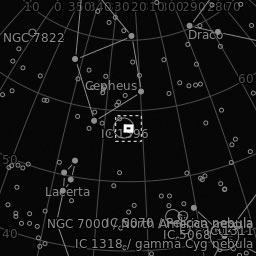
IC 1395A - Elephant trunk
Interstellar gas and dust in the constellation Cepheus.

Interstellar gas and dust in the constellation Cepheus.
The Elephant Trunk Nebula, also known under the catalogue designation IC 1396A, is a brightly bordered globule, i.e. an accumulation of interstellar gas and dust, in the constellation Cepheus.
| Object: | IC 1396A - Elephant trunk |
| Date of exposures: | 11.05.2019, 12.05.2019, 13.05.2019, 14.05.2019 |
| Distance: | 2.400 Lightyears |
| Exposures: | Ha 5nm: 48 x 300", OIII 3nm: 43 x 300", SII 3nm: 44 x 300", RGB E-Series: 45 x 180", Sum: 13,5 hrs. |
| Telescope: | 10'', F4 Newton |
| Focal length: | 1000 mm |
| Filter: | Astrodon H-Alpha 5nm, [OIII] 3nm, RGB E-Series |
| Camera: | ASI 1600 MMC Pro |
| Guiding: | Off Axis Guider, Lodestar |
| Mount: | EQ8 |
The elephant trunk nebula, also known under the catalog name IC 1396A, is a lightly glowing globule, a collection of interstellar gas and dust, in the constellation of Cepheus. The globule belongs to IC 1396, an H-II region with an embedded star cluster, and is about 2,400 light years away from Earth. The nebula is an active star formation area and contains a series of young stars and protostars that are between 100,000 and a million years old. In front of the globule is the reflection nebula van den Bergh 142 (vdB 142), which is very probably physically related. This reflection nebula is irradiated by the B3 star HD 239710.
At the tip of the cone is a pair of stars (LkHa 349 and LkHa 349c) that produced a hollow (orange) in the globule. Investigations with the Spitzer telescope in infrared light showed that the star weakened in the visible light is surrounded by a dust disk, which is regarded as the precursor of a planetary system.
Information about the older image I took in 2017 in my blog ...